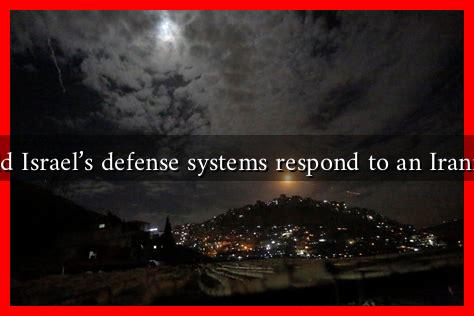-
Table of Contents
How Would Israel’s Defense Systems Respond to an Iranian Attack?
Israel’s geopolitical landscape is fraught with tension, particularly concerning its relationship with Iran. The Islamic Republic has long been viewed as a significant threat to Israel’s national security, primarily due to its nuclear ambitions and support for militant groups in the region. In response, Israel has developed a sophisticated array of defense systems designed to counter potential Iranian attacks. This article explores how these systems would respond in the event of an Iranian offensive.
The Iranian Threat Landscape
Iran’s military capabilities have evolved significantly over the years, with a focus on asymmetric warfare and missile technology. The Iranian military strategy includes:
- Ballistic missiles capable of reaching Israeli territory.
- Drone technology for surveillance and potential strikes.
- Proxy forces in Lebanon (Hezbollah) and Gaza (Hamas) that can launch attacks on Israel.
Given these threats, Israel has invested heavily in its defense infrastructure to ensure it can respond effectively to any aggression from Iran.
Israel’s Multi-Layered Defense Systems
Israel’s defense strategy is characterized by a multi-layered approach, integrating various systems to intercept and neutralize threats at different stages.
. The primary components include:
- Iron Dome: Designed to intercept short-range threats, such as rockets and artillery shells. It has proven highly effective, with a reported interception rate of over 90% during conflicts with Hamas.
- David’s Sling: Aimed at medium- to long-range threats, this system is capable of intercepting missiles and larger projectiles that exceed the range of the Iron Dome.
- Arrow System: Specifically designed to counter ballistic missiles, the Arrow system is a joint project with the United States and is capable of intercepting long-range threats, including those from Iran.
These systems work in concert to create a robust defense network that can adapt to various types of attacks.
Response Scenarios: What Would Happen in an Attack?
In the event of an Iranian attack, Israel’s response would likely unfold in several stages:
- Early Detection: Israel employs advanced radar and satellite systems to detect incoming threats. The Israeli Air Force (IAF) would be alerted immediately to assess the nature and trajectory of the attack.
- Interception: Depending on the type of threat, the appropriate defense system would be activated. For instance, if short-range rockets were launched from Gaza, the Iron Dome would engage. For longer-range missiles, David’s Sling or the Arrow system would be deployed.
- Counter-Strike: Following an interception, Israel would likely launch retaliatory strikes against the source of the attack. This could involve airstrikes targeting Iranian military installations or proxy forces in neighboring countries.
Case Studies: Past Conflicts and Lessons Learned
Israel’s defense systems have been tested in various conflicts, providing valuable insights into their effectiveness:
- 2014 Gaza Conflict: The Iron Dome intercepted approximately 735 out of 1,500 rockets fired at Israel, showcasing its critical role in national defense.
- Recent Tensions with Iran: In 2021, Israel conducted airstrikes against Iranian targets in Syria, demonstrating its proactive approach to neutralizing threats before they can escalate.
These examples highlight the importance of Israel’s defense systems in maintaining national security and deterring potential aggressors.
Conclusion: A Prepared Nation
Israel’s defense systems are a testament to its commitment to national security in the face of persistent threats from Iran. With a multi-layered approach that includes advanced technologies like the Iron Dome, David’s Sling, and the Arrow system, Israel is well-equipped to respond to a variety of attack scenarios. The lessons learned from past conflicts further reinforce the effectiveness of these systems, ensuring that Israel remains vigilant and prepared for any potential aggression.
As tensions continue to simmer in the region, the importance of these defense mechanisms cannot be overstated. Israel’s ability to protect its citizens and maintain stability in the face of external threats is crucial for its future security and sovereignty.
For more information on Israel’s defense strategies, you can visit The Jerusalem Post.





